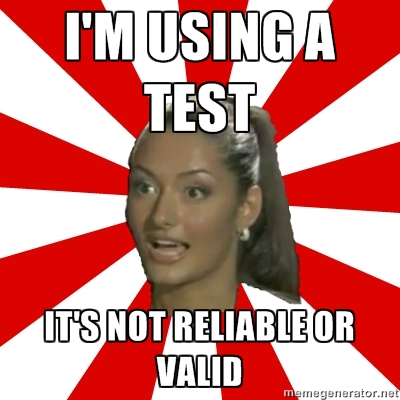Last semester, I gave my research methods students a new assignment on creating image macros.
There were two assignments, one for the chapter on statistics and the other for the chapter on the philosophy of science.
For the philosophy of science chapter this was voted most popular:
In general, for this first assignment, I wasn’t impressed. I felt that what the students were doing did not indicate that they had a good understanding of the concepts (good enough to ‘riff on them).
For the next chapter, on statistics, this was voted as most popular:
and I selected three personal favorites:
The first two indicate an understanding of the concept and the third one is just funny.
After doing this once, I will do it again, but be more clear about my rubrics (for my grading and for the students’ voting). The rubric categories will be:
1. evidence of understand of the concept used
2. evidence of understanding of the meme used
3. how funny and clever it is
While understanding the concept is obviously important, understanding and using the right meme is important also. That’s what this assignment is about — using memes as a tool to communicate something about research methods. Not understand the tool and using it correctly is like writing a bad essay, giving a bad talk or misusing powerpoint during a talk.
In my examples, I tried to work within the meme. For example:
This meme is called “Clueless Claire” and the theme of the meme is that Claire is clueless and illustrates how ignorant she is. Thus, my clueless Claire meme was
a clueless thing students do every semester — using a test without presenting evidence that the test is reliable or valid.
So, I feel that this is a very good assignment for research methods students, if I change the assignment to encourage my students to think about the concept and meme.
Finally, this occurred to me after the semester was over. The Super Cool Ski Instructor meme may be a very direct way to get students to think about avoiding mistakes in class,
or as a way that one semester’s students can give advice to the students of the next semester.













Thanks!
Bill, great use of digital storytelling for research methods assignment. The ds106 crowd would be proud. Really awesome.
Pingback: Round Up! : Footenotes